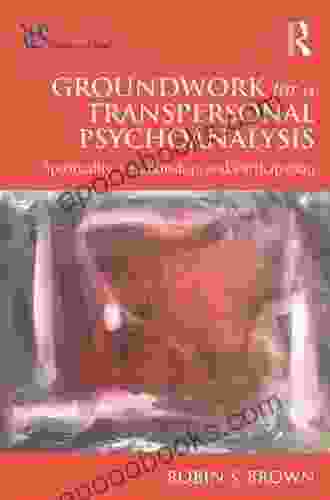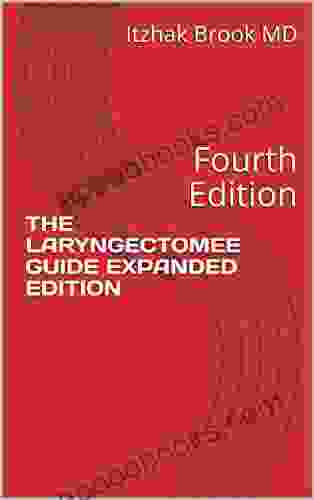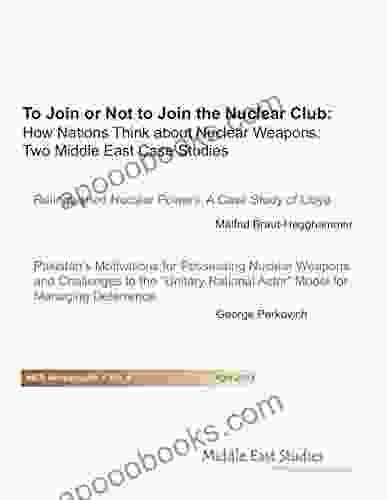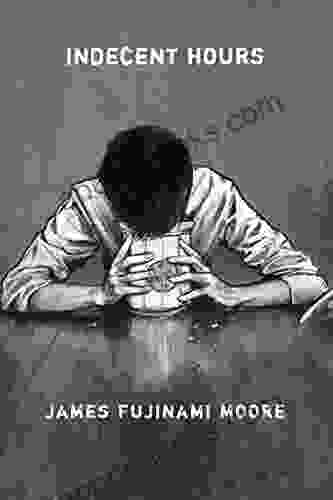To Join or Not to Join the Nuclear Club: A Critical Examination of the Costs and Benefits

4.7 out of 5
| Language | : | English |
| File size | : | 184 KB |
| Text-to-Speech | : | Enabled |
| Screen Reader | : | Supported |
| Enhanced typesetting | : | Enabled |
| Word Wise | : | Enabled |
| Print length | : | 26 pages |
| Lending | : | Enabled |
The decision of whether or not to join the nuclear club is one of the most consequential decisions that a country can make. Nuclear weapons are the most powerful weapons ever created, and they have the potential to cause unimaginable destruction. Joining the nuclear club can provide a country with increased national security and deterrence, but it also comes with significant risks, including the potential for nuclear proliferation and the threat of nuclear war.
In this article, we will examine the debate surrounding the decision of whether or not to join the nuclear club. We will explore the potential benefits and risks, as well as the ethical implications and the role of international law. By the end of this article, you will have a better understanding of the complex issues involved in this decision, and you will be able to make an informed opinion on whether or not you believe that your country should join the nuclear club.
The Benefits of Joining the Nuclear Club
There are several potential benefits to joining the nuclear club. First, nuclear weapons can provide a country with increased national security. Nuclear weapons are a deterrent to attack, and they can make a country less likely to be invaded or attacked. Second, nuclear weapons can give a country more influence in international affairs. Nuclear-armed countries are often seen as more powerful and influential than non-nuclear-armed countries. Third, nuclear weapons can provide a country with a sense of pride and prestige. Nuclear weapons are often seen as a symbol of national strength and power.
The Risks of Joining the Nuclear Club
There are also several risks associated with joining the nuclear club. First, nuclear weapons are expensive to develop and maintain. Nuclear weapons programs can divert resources from other important areas, such as healthcare and education. Second, nuclear weapons can lead to nuclear proliferation. Nuclear-armed countries are more likely to be targeted by other countries, and they are more likely to be involved in nuclear wars. Third, nuclear weapons pose a threat to the environment. Nuclear explosions can release radioactive material into the environment, which can cause health problems and environmental damage.
The Ethical Implications of Nuclear Weapons
The use of nuclear weapons raises serious ethical concerns. Nuclear weapons are indiscriminate weapons, and they can cause massive civilian casualties. The use of nuclear weapons can also have devastating long-term environmental consequences. Some people believe that the use of nuclear weapons is immoral, and that they should be banned. Others believe that nuclear weapons are necessary for deterrence, and that they should be used if necessary to defend a country from attack.
The Role of International Law
International law plays a role in regulating the use of nuclear weapons. The United Nations Charter prohibits the use of force except in self-defense. The Nuclear Non-Proliferation Treaty (NPT) is an international treaty that prohibits the spread of nuclear weapons. The NPT has been signed by over 190 countries, but some countries, such as North Korea and Iran, have not signed the treaty. There are also several other international treaties and agreements that relate to nuclear weapons.
The decision of whether or not to join the nuclear club is a complex one. There are significant potential benefits to joining the nuclear club, such as increased national security and deterrence. However, there are also significant risks associated with joining the nuclear club, such as the potential for nuclear proliferation and the threat of nuclear war. The ethical implications of nuclear weapons are also a serious concern.
Ultimately, the decision of whether or not to join the nuclear club is a decision that each country must make for itself. There is no easy answer, and there is no right or wrong decision. However, it is important to be aware of the potential benefits and risks involved in this decision, and to make an informed decision based on the best interests of your country.
4.7 out of 5
| Language | : | English |
| File size | : | 184 KB |
| Text-to-Speech | : | Enabled |
| Screen Reader | : | Supported |
| Enhanced typesetting | : | Enabled |
| Word Wise | : | Enabled |
| Print length | : | 26 pages |
| Lending | : | Enabled |
Do you want to contribute by writing guest posts on this blog?
Please contact us and send us a resume of previous articles that you have written.
 Book
Book Novel
Novel Page
Page Chapter
Chapter Text
Text Story
Story Genre
Genre Reader
Reader Library
Library Paperback
Paperback E-book
E-book Magazine
Magazine Newspaper
Newspaper Paragraph
Paragraph Sentence
Sentence Bookmark
Bookmark Shelf
Shelf Glossary
Glossary Bibliography
Bibliography Foreword
Foreword Preface
Preface Synopsis
Synopsis Annotation
Annotation Footnote
Footnote Manuscript
Manuscript Scroll
Scroll Codex
Codex Tome
Tome Bestseller
Bestseller Classics
Classics Library card
Library card Narrative
Narrative Biography
Biography Autobiography
Autobiography Memoir
Memoir Reference
Reference Encyclopedia
Encyclopedia Robert E Shadwick
Robert E Shadwick Sofia Aves
Sofia Aves Swapan Kumar Ghosh
Swapan Kumar Ghosh Michael J Daugherty
Michael J Daugherty Sabin Prentis
Sabin Prentis Jay Rogoff
Jay Rogoff Logan Ury
Logan Ury Geri Krotow
Geri Krotow Mike Bhangu
Mike Bhangu Tim Minchin
Tim Minchin Will Cordeiro
Will Cordeiro Tony Hillerman
Tony Hillerman Tom Bowman
Tom Bowman Wahida Clark
Wahida Clark Tom Brokaw
Tom Brokaw Sarah Morgan
Sarah Morgan Susan Rowland
Susan Rowland Lee Garratt
Lee Garratt L Steele
L Steele J Caldwell
J Caldwell
Light bulbAdvertise smarter! Our strategic ad space ensures maximum exposure. Reserve your spot today!

 Dwight BlairSoothing the Soul: Discover the Enchanting World of Lots of Love Lullabies by...
Dwight BlairSoothing the Soul: Discover the Enchanting World of Lots of Love Lullabies by...
 Mike Hayes50 Classic Poems of Desire, Longing, and Devotion: A Journey into the Heart's...
Mike Hayes50 Classic Poems of Desire, Longing, and Devotion: A Journey into the Heart's...
 Desmond FosterSpirituality, Relationships, and Participation: A Journey into Psyche and...
Desmond FosterSpirituality, Relationships, and Participation: A Journey into Psyche and...
 Russell MitchellThe Essential Guidebook for Laryngectomees: Unlocking the Journey to Recovery...
Russell MitchellThe Essential Guidebook for Laryngectomees: Unlocking the Journey to Recovery... Corey HayesFollow ·3.9k
Corey HayesFollow ·3.9k Marcus BellFollow ·3.2k
Marcus BellFollow ·3.2k Bryson HayesFollow ·4.7k
Bryson HayesFollow ·4.7k Federico García LorcaFollow ·15.4k
Federico García LorcaFollow ·15.4k Julio Ramón RibeyroFollow ·3.6k
Julio Ramón RibeyroFollow ·3.6k Henry JamesFollow ·17.5k
Henry JamesFollow ·17.5k Jon ReedFollow ·19.9k
Jon ReedFollow ·19.9k Finn CoxFollow ·6.5k
Finn CoxFollow ·6.5k

 Harry Cook
Harry CookRape Blossoms and White Sky: A Floral Symphony of...
A Kaleidoscope of Colors...

 Vic Parker
Vic ParkerThe Passion of Jovita Fuentes: Unveiling the...
Immerse yourself in the...

 Cormac McCarthy
Cormac McCarthySinners and Saints: A Dark New Adult High School Bully...
Sinners and Saints is...
4.7 out of 5
| Language | : | English |
| File size | : | 184 KB |
| Text-to-Speech | : | Enabled |
| Screen Reader | : | Supported |
| Enhanced typesetting | : | Enabled |
| Word Wise | : | Enabled |
| Print length | : | 26 pages |
| Lending | : | Enabled |










